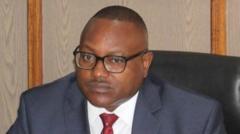Zambia's foreign minister, Mulambo Haimbe, has cautioned diplomats against public criticism of the government after allegations of systematic aid theft surfaced, particularly following statements by the US ambassador.
Zambia's Foreign Minister Issues Warning to Diplomats Following US Aid Theft Allegations

Zambia's Foreign Minister Issues Warning to Diplomats Following US Aid Theft Allegations
Tensions rise as Zambia reacts to US ambassador's comments on health aid fraud.
Zambia's foreign ministry has responded sternly to what it perceives as diplomatic overreach by envoys. This comes in the wake of serious allegations raised by US ambassador Michael Gonzales regarding the theft of health supplies that were intended for the Zambian people.
During a recent press conference, Gonzales disclosed that the US would be cutting $50 million in health aid to Zambia due to the misappropriation of critical medications. He explained that despite multiple discussions with Zambian officials—over 30 meetings in total—little progress had been made in addressing concerns about the theft.
In his response, Haimbe emphasized the importance of adhering to established diplomatic protocols, stating that matters should be discussed through appropriate channels rather than the media. His remarks were widely interpreted as directed specifically at Gonzales.
Reports indicate that the US embassy had previously communicated its findings on these allegations to Zambian leaders as far back as April of the previous year, but no actions appeared to have been taken, according to their statements.
Further complicating the situation, Zambia’s Home Affairs Minister, Jacob Mwiimbu, confirmed that a forensic audit into the alleged fraud had been completed and is now with security agencies for follow-up. This investigation has already led to the arrest of approximately 75 individuals across the nation and involved the raiding of over 400 health facilities.
The ambassador revealed troubling statistics from a US inspection of over 2,000 pharmacies in Zambia, with the majority found to be selling drugs that had been donated by the US. The Health Minister of Zambia, Elijah Muchima, noted that the issues of drug theft predated the current administration and that efforts have been made internally to enhance oversight through digital stock tracking systems and other measures.
While the US aid cut is expected to impact the supply of essential medications for diseases like malaria, HIV, and tuberculosis, Muchima attempted to reassure the public that adequate stock remains available to avoid immediate shortages.
This diplomatic dispute occurs in a broader context of US aid dynamics, with the US reportedly contributing approximately one-third of Zambia's public health expenditure. Future funding prospects remain uncertain, particularly following previous criticisms from Zambian leaders regarding past aid freezes.
As these developments unfold, the relationship between Zambia and its foreign partners will be crucial in determining the effectiveness of health programs and the integrity of aid distribution moving forward.
During a recent press conference, Gonzales disclosed that the US would be cutting $50 million in health aid to Zambia due to the misappropriation of critical medications. He explained that despite multiple discussions with Zambian officials—over 30 meetings in total—little progress had been made in addressing concerns about the theft.
In his response, Haimbe emphasized the importance of adhering to established diplomatic protocols, stating that matters should be discussed through appropriate channels rather than the media. His remarks were widely interpreted as directed specifically at Gonzales.
Reports indicate that the US embassy had previously communicated its findings on these allegations to Zambian leaders as far back as April of the previous year, but no actions appeared to have been taken, according to their statements.
Further complicating the situation, Zambia’s Home Affairs Minister, Jacob Mwiimbu, confirmed that a forensic audit into the alleged fraud had been completed and is now with security agencies for follow-up. This investigation has already led to the arrest of approximately 75 individuals across the nation and involved the raiding of over 400 health facilities.
The ambassador revealed troubling statistics from a US inspection of over 2,000 pharmacies in Zambia, with the majority found to be selling drugs that had been donated by the US. The Health Minister of Zambia, Elijah Muchima, noted that the issues of drug theft predated the current administration and that efforts have been made internally to enhance oversight through digital stock tracking systems and other measures.
While the US aid cut is expected to impact the supply of essential medications for diseases like malaria, HIV, and tuberculosis, Muchima attempted to reassure the public that adequate stock remains available to avoid immediate shortages.
This diplomatic dispute occurs in a broader context of US aid dynamics, with the US reportedly contributing approximately one-third of Zambia's public health expenditure. Future funding prospects remain uncertain, particularly following previous criticisms from Zambian leaders regarding past aid freezes.
As these developments unfold, the relationship between Zambia and its foreign partners will be crucial in determining the effectiveness of health programs and the integrity of aid distribution moving forward.



















